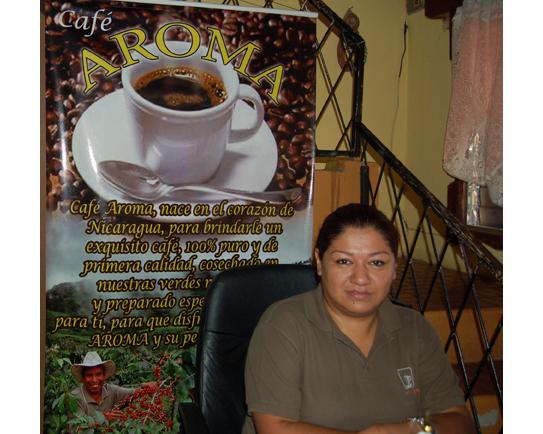

Coffee as a route to women’s empowerment

María José Blandón Villavicencio, a Nicaraguan housewife turned coffee producer, has a sales record that would make any entrepreneur green with envy: 1600% growth in her first year.
Blandón founded her business, “Café Aroma” – which buys, processes and packages coffee – 12 months ago in Matagalpa, one of Nicaragua’s finest coffee-producing regions. She started out selling 25 pounds of coffee a month, using the gas-guzzling family van to make her deliveries.
But spurred by two small loans – one, a $1,200 microcredit from the MDG Achievement Fund – Blandón quickly ramped up, replacing the van with a more fuel-efficient motorcycle, and increasing her client list to include restaurants, schools and even the local city council. Today “Café Aroma” sells 400 pounds of coffee a month, and Blandón is setting her sights on new markets in the capital, Managua.
Supporting women's ambitions
“I always had this ambition to move on from being a housewife to generating an income,” says Blandón, whose work garnered her a prize from the Nicaraguan Institute of Small and Medium Enterprises. She has taken courses on product design and patent and trademark registration, and is about to launch her company’s website. Her coffee so impressed a Canadian tourist recently that the two have formed a partnership to export Café Aroma’s products to Canada.
Blandón is one of thousands of Nicaraguan women who are benefitting from the MDG-F-funded “From Rhetoric to Reality” United Nations joint programme, whose aim is to promote gender equality and women’s economic empowerment.
A key component is to increase women’s participation in decision-making in all spheres of Nicaraguan life, part of the MDG-F’s global effort to give an equal voice and equal opportunities to the world’s most disadvantaged citizens. The MDG-F is supporting the National Gender Equity Programme as a way to help Nicaragua achieve the Millennium Development Goals of eradicating hunger and poverty and promoting equality for women.
The UN joint programme operates in 15 municipalities around Nicaragua, and has so far trained 2,300 community leaders in gender and development, improved access to sexual and reproductive health for 3,000 women and made microcredit loans to 165 female entrepreneurs. Some 500 men have also been trained in setting up networks to prevent violence against women.
Empowered by her economic success, María José Blandón has decided to pursue a higher academic degree and is now enrolled in a theology course. She is also working with her brother to expand her business to Costa Rica, and will be participating in the International Food Festival in Miami next year.
Blandón ’s experiences have made her an example to other women, and she regularly leads workshops for hundreds of other female entrepreneurs. Working with the municipality, the church and a government-backed professional organization supported by the MDG-F, Blandón is also spearheading the creation of a businesswomen’s network in Matagalpa.
“Thanks to the Programme, I feel that dreams really can come true,” she says.
Joint action to empower women
The Joint United Nations Programme "From rhetoric to reality: towards gender equality and empowerment of women through participation and gender practices in public budgets" is led by UN Women and is a collaboration between the Nicaraguan government and other UN agencies like FAO, UNDP, UNFPA, UNICEF, UNCDF, ILO, PAHO and the World Food Program.
It is one of six joint UN programmes in Nicaragua funded by the MDG-F as part of its global mission to help governments achieve the Millennium Developments Goals of reducing poverty and improving life for their citizens by the 2015 deadline.